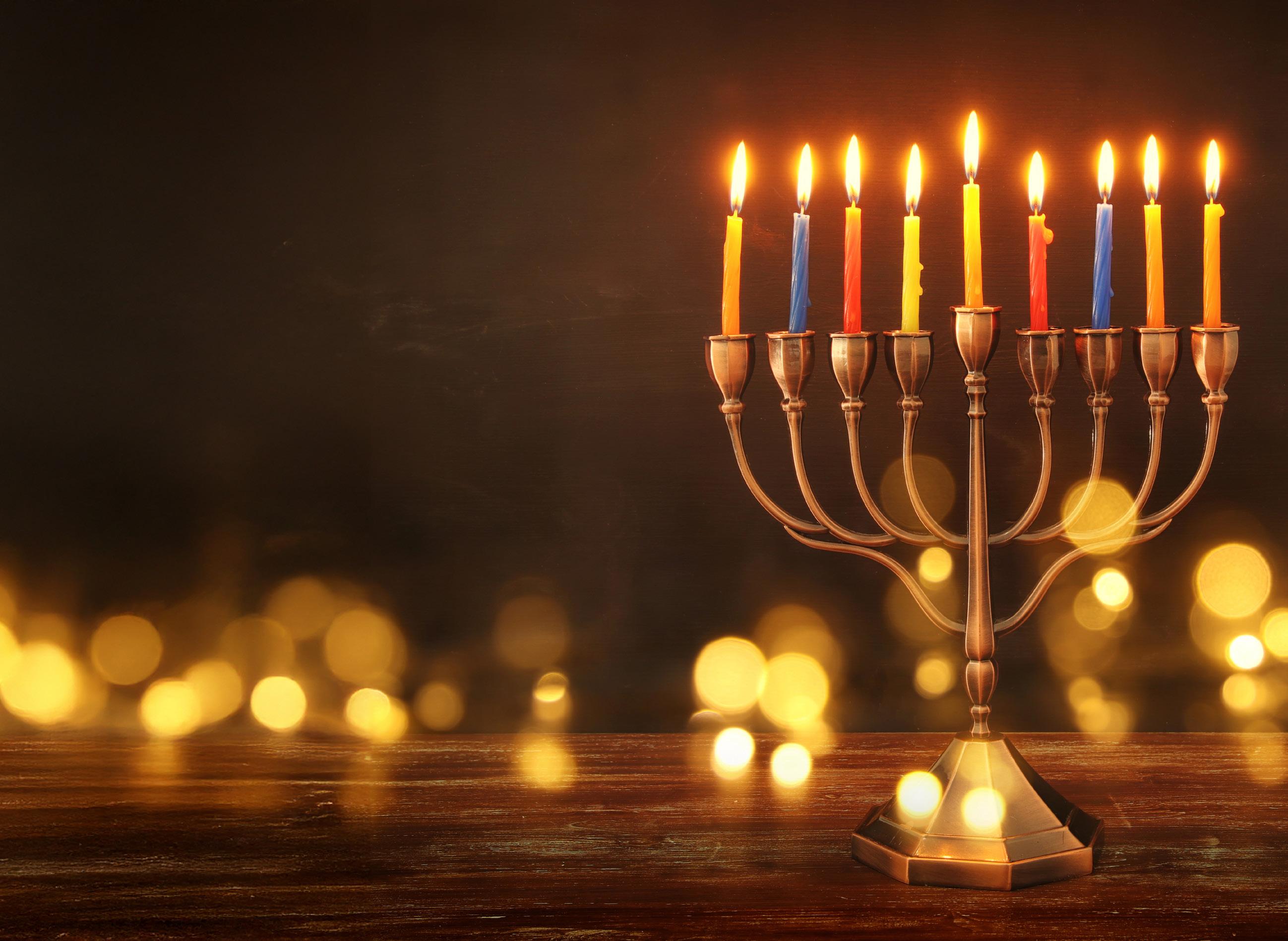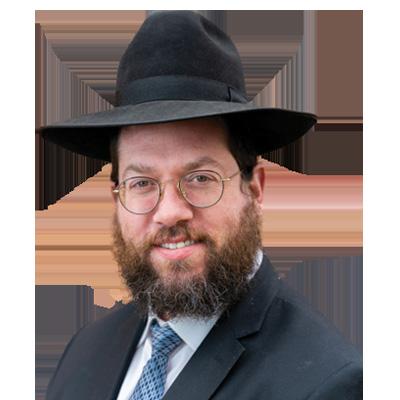
6 minute read
Parshas Mikeitz –Shabbos Chanukah

BY RABBI MICHOEL FRANK
The Yevanim made a number of decrees against Klal Yisrael, as we say in Al Hanisim – םריבעהל
יקחמ. Of those are Shabbos, Milah, Rosh Chodesh, and the Meforshim expound on what it was that the Yevanim had against those particular mitzvos. In doing so, they attribute quite a bit of understanding of Jewish Mitzvos and ideals to the Yevanim, and I wondered, how would the Yevanim have known so much about our Torah and Mitzvos?
But I found a Medrash quoted which answers that question, and indeed it makes sense, because it is something that repeated itself through history as well. The Medrash says: with evil advice against the Jews. He said, they have one Mitzvah which if they don’t perform it they will be lost from this world, and it is lighting the Menorah in the Beis Hamikdash, as it says… and it says in Koheles, give a portion to seven and to eight, meaning whoever has a part in the seven lights that are always burning in the Beis Hamikdash, and also the eight days of Sukkos, no being can overcome them. Therefore, the Greeks went and defiled all the oils in the Beis Hamikdash.
The Medrash continues:
There was an evil convert, who had become a Misyavni, named Tatni ben Pachas, who was advising the Greeks
This is how the Greeks knew what was important and what it signified – there was an inside source! Throughout history, the Jews were always the worst enemies of the Jews unfortunately. This Misyavni wasn’t giving advice how to overcome the Jews in war, rather he was telling them how to break the spirit of the Jews. If you take away these two mitzvos from the Jews, it will break them and they will lose their will. But this Medrash now added a fascinating point: The Greeks sought to both eradicate the Menorah and the eight days of Sukkos! What is the connection and significance of that decree – and why was this so significant to the Jews?
A miracle occurred, and they lit one small jug for eight days, and Hashem established for them the eight days of Chanukah, which weren’t a Yom Tov until that point, Hashem said: You planned on uprooting the seven lights and the eight days of Sukkos, I will bring eight days of Chanukah and the seven sons of Chashmonai.
Again, we see a close connection between Sukkos and Chanukah, so much so, that the eight days of Chanukah were there to spite the Greeks and overcome their plan, they wanted to uproot the eight days of Sukkos, now we have both Sukkos and Chanukah! What is the significance of this?
The world around us is progressively going crazier and crazier, in their attempt to create the greatest ‘equality’ possible. Stanford University published a list of 1000 words for their “Elimination of Harmful Language
Initiative,” which was intended for the IT department. Among their banned words is ‘Mankind,’ because it gives too much dominance to males, ‘American’, because it insinuates that people of South America aren’t ‘Americans,’ and you have to refer to all people as ‘it’!
Inequality is something that Hashem created in creating the world. The Jewish nation was formulated with Kohanim, Levi’im, and Yisraelim, and when Korach attempted to abolish that it ended in disaster. It is a necessity for the success of the world and society that there be those who are wealthy, are successful, have advantages, because it motivates the world to succeed. Society only moves forward and innovates, creates, and progresses, if there is motivation to do so. The motivation is the success of those who are lucky enough, and work hard enough to achieve it. Even the difference in advantage which has nothing to do with effort, is important to motivate different parts of society to achieve their best, and to succeed within the framework that Hashem has handed to them. Hashem created men and women, with a different task for each in mind. When society tries to abolish these natural categories, such as communism, which tried to abolish wealth, their society failed – people lost all motivation to succeed.
When Hashem created the world, He intended that there would be one chosen nation, תישאר ליבשב תישארב, Hashem created for the sake of the ‘first’ ones, who eventually became Klal Yisrael, but it could have been anyone. But the fact that there was one chosen nation is important and essential to the success of the world, because they provide an example and motivation to become great in spirituality.
The Yom Tov of Sukkos is all about demonstrating Klal Yisrael’s superiority among the nations. We bring 70 bulls throughout the Yom Tov, and on Shemini Atzeres we bring only one, to demonstrate that Hashem wants to be with us alone. The 70 bulls are brought to benefit the nations, as Chazal say if they would have understood the value – they would have surrounded the Beis Hamikdash with an army to protect it. But nevertheless, it means that the nations only get their העפשה and blessing through the efforts of Klal Yisrael. This is inherent in all that we do during Sukkos, even Lulav and Esrog, as the Medrash says. This angered the Yevanim and made them resent us! This is what they tried to accomplish by wiping out the Yom Tov of Sukkos – so that the Jews would lose their conviction in their own superiority and mission.
The Aruch Hashulchan uses this Medrash as another way to answer the question of the Beis Yosef. The Beis Yosef asks that why would we have 8 days of Chanukah if the miracle was only truly the fact it burnt for an extra 7 days – not 8? The Aruch Hashulchan answers based on this Medrash that Chanukah came to make up for the 8 days of Sukkos which had been prevented through the decrees of the Yevanim, and Hashem demonstrated to them that He approved by performing this miracle – that’s why we have 8 days of Chanukah – exactly as the Medrash says – to correspond to the eight days of Sukkos they tried to eradicate.
The Menorah as well is םלוע יאבל תודע לארשיב הרוש הניכשהש – it testifies to the uniqueness of Klal Yisrael that Hashem’s presence rests on them alone. This too angered the Yevanim and was why they were trying to wipe this out.
What is the uniqueness of Klal Yisrael? What example are we setting? The life of a Jew is very different than that of a non-Jew. What we call success is very different! We can have a person who never was able to hold down a job, lives from paycheck to paycheck, has a 20-year-old car that barely runs, a decrepit home – yet we will consider him very successful if he is a Talmid Chacham, learns Torah all the time, is a Yarei Shamayim, davens beautifully! Because we categorize success by the World-to-Come – not this world. We live for the next world, and we measure success by how much a person has succeeded in accomplishing his mission to serve Hashem in life. If a person was zocheh to become a Talmid Chacham – that is the luckiest and most fortunate person, if he has children Talmidei Chachamim – he’s hit the jackpot! This is what a Jew lives for! It is this message we are trying to spread in the world – live for ruchniyos, success is Avodas Hashem. I saw a story about Rav Eliezer Ben David, who has founded and created kollelim and yeshivos in Eretz Yisrael and South America and USA, for the Iranian community. As a young bachur he lived in Iran, and learned Hebrew, was even a leader for the youth there, but it wasn’t enough. He wanted to learn Torah! He made up his mind to travel to Eretz Yisrael, a very difficult trip – and learn in Yeshivas Ponavezh! His father made him sign away his inheritance in an effort to discourage him, but he wasn’t deterred. He made it to Ponavezh, and met with the Ponavizher Rav. The rav asked him, ‘Do you know Gemarah?’ He said no. ‘Do you know Mishnayos?’ No. What do you know? Hebrew! The rav said, ‘This isn’t the place for you –it is for advanced Gemarah learners. You need to learn quite a bit before you can join our Yeshiva!’ Rav Eliezer’s face fell and he began to cry. At that moment the Ponavizher Rav said, ‘I retract my first statement! You can join the Yeshiva!’ The rav made sure that he found chavrusas willing to teach him from the ground up, and he developed into the tremendous marbitz Torah he is today.
He was once in an airport in the Midwest, with his wife, when a stranger, not Jewish approached him. ‘Are you both Jewish?’ the man asked. They said, ‘Yes!’ He looked at them with awe, and said, ‘Can I shake your hands? I’ve always wanted to meet a Jew, who stood at Sinai, and are the true children of God!’ Then he asked them, ‘Forgive me for asking a personal question, but when you, a Jew, the nation that so many prophets came from, walk in the street, do you think the same kind of thoughts we do, or is your mind occupied with different things?!’ I don’t know what Rav Eliezer answered but he said, ‘I have never gotten a better mussar schmooze than I got from that non-Jew!’
This is what a Jew’s life is meant to be!











